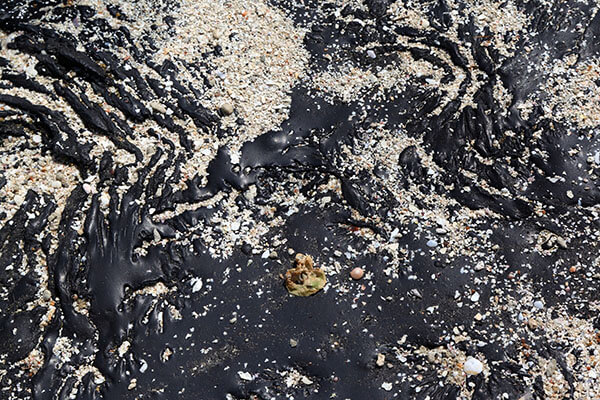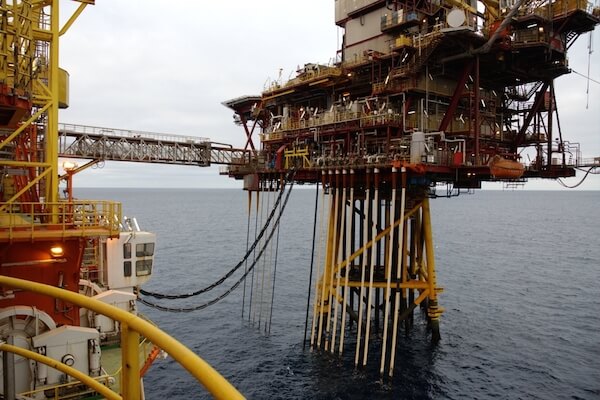Tag Archive for: north sea
An oil spill at an Exxon Mobil platform in the Bass Strait is being investigated by the federal regulator, after the discovery of an oily sheen on waters around the rig.
The spill comes less than 18 months after a fire raged on the same platform for nine hours before it could be controlled. And in 2013, Exxon was responsible for a spill from another rig in the Bass Strait.
Environmentalists have said the spill is a reminder of the inherent dangers of offshore oil drilling, and called for planned oil drilling in the Great Australian Bight to be stopped.
North Sea or Great Australian Bight, oil drilling is always a risky business
On Thursday, the National Offshore Petroleum Safety and Environmental Management Authority (Nopsema) posted an alert saying Esso, a company owned by ExxonMobil, had informed it of an oil sheen alongside its West Tuna platform in the Bass Strait the previous day.
The platform is 45km off the Gippsland coast in Victoria. The cause of the spill, and how much oil contaminated the water, was not yet known.
A spokesman for ExxonMobil said it was still investigating the cause of the spill.
“On Wednesday, 1 February an oil sheen was observed on the water near the West Tuna platform in the Bass Strait,” he said. “Esso responded immediately and continues to investigate potential sources of the sheen observed on 1 February.
“The Tuna to West Tuna pipeline, which is the pipeline nearest to the observed sheen, was shut-in at the time of original observation due to planned maintenance on West Tuna platform and remains shut in and not in operation.”
The Greenpeace oceans campaigner, Nathaniel Pelle, said: “Offshore oil drilling is risky business for our oceans and fisheries industries, as this latest oil spill near one of Australia’s largest fisheries shows.
“This spill in the Bass Strait should send a clear ‘wrong-way-go-back’ signal to the federal government, which is set to consider exploratory oil drilling by Chevron in the Great Australian Bight – a nursery for southern right whale calves.”
In September 2015 an electrical fire raged for nine hours on the same rig. It caused all the lights on the platform to go out, forcing an evacuation to occur at night without lights.
In 2013, another ExxonMobil rig in the Bass Strait spilled about 750 litres of oil into the water.
The Exxon spokesperson defended the company’s safety procedures.
“Our platforms and pipelines are operated in accordance with ExxonMobil’s operations integrity management system, together with regulator approved safety cases and environmental plan which are systems to ensure the safety and health of personnel, maintain facilities integrity, and protect the environment,” he said.

Offshore safety across oil and gas operations on the UK Continental Shelf (UKCS) continued to improve in 2015, according to the 2016 Oil & Gas UK Health & Safety Report published August 1.
There were no reported fatalities and reportable injury rates were lower than other industries such as manufacturing, construction, retail and education. The lost time injury frequency rate on the UKCS was also below the European average and lower than Norway, Denmark and Ireland.
The category of dangerous occurrences – which captures oil and gas releases, fires or explosions, dropped objects and weather damage – was down overall too, with an almost 30 percent fall between 2013 and 2015. Within that category, the total number of oil and gas releases rose slightly by 9 percent, with the majority of these classified as minor, while major releases remained the same.
A rise in minor releases could partially reflect that more and more operators are using technology that helps detect the smallest of escapes. New reporting criteria also came into place in the second half of 2015 and now includes releases that were not deemed reportable under previous legislation.
In March 2015 the Forties Echo platform in the North Sea was shut after being hit by a supply vessel, which resulted in 15 workers being transferred to the nearby Forties Bravo platform. In July 2015, oil and gas industry skills organization OPITO reported a 250 percent rise in the number of North Sea energy firms investing in systems which assess and develop workforce competence and safety.
“I am pleased to say there were no reported fatalities on the UK Continental Shelf in 2015. Health and Safety Executive statistics in our report show that the industry non-fatal injury rate and the over-seven-day and specified injuries rates also decreased,” said Mick Borwell, health, safety and environment policy director at Oil & Gas UK.
“That picture of personal safety improvement was echoed in the smaller annual benchmarking exercise that we carry out ourselves. We looked at 28 production operators and found a continuing downward trend in the average frequency of reportable injuries and dangerous occurrences,” he added.
“This is a testing time for the industry and our commitment to safety has, at times, been questioned. However, our report demonstrates that safe operations continue to be intrinsic to how we go about our activities on the UK Continental Shelf, regardless of the oil price. It shows that the UK sector is focusing in the right areas and overall is heading in the right direction. The report is also a reminder that there is no place for compromise or complacency and that safety must remain at the top of our agenda,” Borwell concluded.

Scroll to top

 Breaking Barriers and Building the Future18 March, 2025
Breaking Barriers and Building the Future18 March, 2025 Fundamental factors to strengthen Pemex12 August, 2019
Fundamental factors to strengthen Pemex12 August, 2019 Offshore Project Development: The Road to First Oil26 July, 2019
Offshore Project Development: The Road to First Oil26 July, 2019
